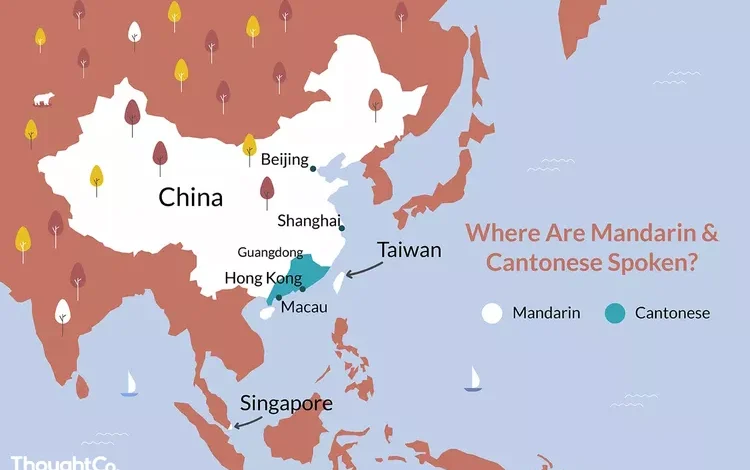Cantonese vs Mandarin: Understanding the Differences

Language is a bridge that connects cultures, and in China, two dialects stand out prominently: Cantonese and Mandarin. As we delve into the fascinating world of Cantonese vs Mandarin, we’ll explore their origins, characteristics, and roles in Chinese society. Whether you’re interested in learning a new language or simply curious about these dialects, this article will provide valuable insights.
What Are Cantonese and Mandarin?
Cantonese and Mandarin are two major dialects of the Chinese language, each with its unique features and cultural significance.
- Mandarin is the official language of China and Taiwan and is widely spoken in Singapore. It’s based on the Beijing dialect and serves as a lingua franca among Chinese speakers from different regions.
- Conversely, Cantonese is primarily spoken in Guangdong, Hong Kong, and Macau. Its rich history and cultural heritage make it an essential part of Chinese identity, especially in southern China.
Historical Context
The Origins of Mandarin
Mandarin has its roots in the northern dialects of Chinese. It became prominent during the Ming and Qing dynasties when it was adopted as the official language. Over time, its influence spread throughout China, becoming the standard for education, government, and media.
The Evolution of Cantonese
Cantonese has a long history, dating back to the Tang dynasty (618-907 AD). It evolved in the southern regions of China and has retained many archaic features not found in Mandarin. This dialect is a means of communication and a vessel of culture, reflecting its speakers’ customs, traditions, and everyday life.
Phonetics: Sounding It Out
One of the most significant differences between Cantonese and Mandarin is their phonetics.
Tones
- Mandarin has four primary tones:
- First tone: high and level
- Second tone: rising
- Third tone: low and then rising
- Fourth tone: sharp and falling
- Cantonese is known for its complexity, boasting six to nine tones, depending on the region. This tonal variety means a single syllable can have multiple meanings based on pronunciation. For instance, the word “ma” can mean “mother,” “hemp,” or “horse,” depending on the tone used.
Consonants and Vowels
- Mandarin has a more straightforward consonant and vowel structure, making it easier for learners.
- Cantonese, however, includes a broader range of sounds, including final consonants, that can be challenging for non-native speakers.
Vocabulary and Expressions
The vocabulary in Cantonese vs Mandarin also differs significantly. While many words are similar, each dialect has unique expressions and idiomatic phrases.
Everyday Vocabulary
Here’s a quick comparison of some common words:
EnglishMandarin (Pinyin)Cantonese (Jyutping)
Hello Nǐ hǎo Néih hǎo
Thank you Xièxiè M̀h’gōi
Goodbye Zàijiàn Joi gin
Water Shuǐ Sui2
Slang and Informal Language
Cantonese is renowned for its colorful slang and informal expressions. It’s often said that Cantonese speakers have a more expressive way of communicating. For example, the term “chok” in Cantonese means to forcefully imitate someone or something, which doesn’t have a direct equivalent in Mandarin.
Cultural Significance
Role in Chinese Society
Both dialects hold significant cultural weight, but their usage varies by region.
- Mandarin is predominant in mainland China’s education, government, and formal communication. Its status as the national language promotes unity among the diverse Chinese population.
- Cantonese is a critical local culture and heritage identifier, particularly in Hong Kong. It’s commonly used in media, music, and daily life, fostering a sense of community among its speakers.
Influence on Media and Entertainment
The entertainment industry also reflects the differences between Cantonese and Mandarin.
- Mandarin-language films and television shows dominate mainland China’s media landscape, focusing on national themes and modern stories.
- In contrast, Hong Kong’s film industry, known for its vibrant cinema, primarily produces movies in Cantonese. These films often reflect local culture and societal issues, attracting domestic and international audiences.
Learning Curve: Which One Should You Choose?
If you’re contemplating learning a new language, the choice between Cantonese and Mandarin depends on your goals and interests. Here are a few considerations:
Reasons to Learn Mandarin
- Global Importance: As the most spoken language in the world, Mandarin is advantageous for business and travel.
- Standardization: With a consistent grammar structure and fewer tones, many find Mandarin easier to learn.
Reasons to Learn Cantonese
- Cultural Connection: If you’re interested in Hong Kong culture or plan to live there, learning Cantonese can deepen your understanding of the local community.
- Expressive Language: Cantonese is known for its rich slang and idioms, providing a unique way to express emotions.
Resources for Learning
Online Courses
- Mandarin: Websites like Duolingo, Rosetta Stone, and ChinesePod offer structured courses for beginners.
- Cantonese: Resources like CantoneseClass101 and YouTube channels provide lessons tailored explicitly to Cantonese learners.
Language Exchange Programs
Participating in language exchange programs can enhance your learning experience. Websites like Tandem and HelloTalk connect learners with native speakers, allowing real-world practice.
Final Thoughts
In conclusion, both Cantonese vs Mandarin offer rich and vibrant linguistic experiences. While Mandarin serves as a gateway to understanding the broader Chinese culture, Cantonese connects you to the unique traditions of southern China.
Whether you dive into Cantonese’s melodious tones or Mandarin’s structured elegance, the journey of learning these dialects can be incredibly rewarding. Embrace the challenge, and you’ll discover not just a language, but a deeper appreciation for the culture and history that shapes it.
Additional Resources
For further reading and resources on Cantonese vs Mandarin, consider exploring:
- Books: “Chinese Made Easy” for Mandarin and “Colloquial Cantonese” for Cantonese.
- Websites: The Chinese Language Institute offers insights and resources for learners of both dialects.
Conclusion
Understanding Cantonese vs Mandarin is about more than just learning different ways to communicate. It’s about connecting with a culture that has influenced countless aspects of life worldwide. By learning either dialect, you’re gaining a skill and becoming a part of a vibrant heritage. So, which path will you choose in this fascinating linguistic journey





